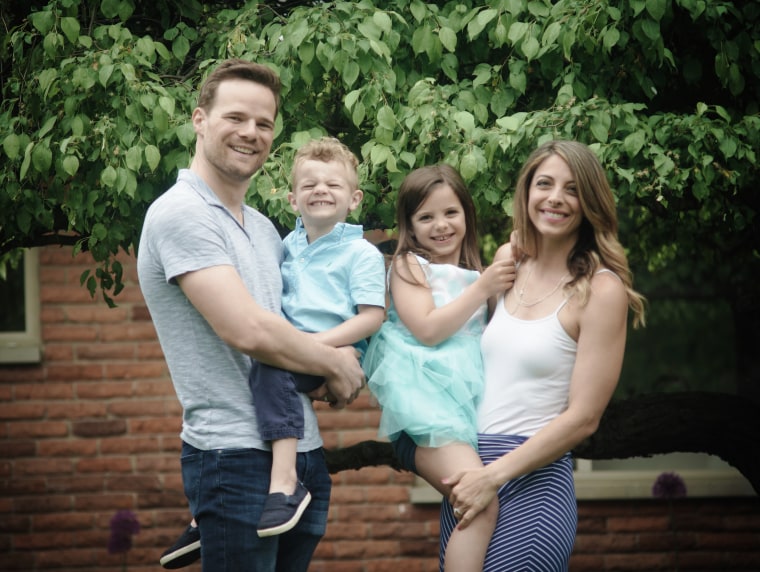Michigan couple Andy and Nicole Hill, 36, paid off their mortgage in four years by living on just half their monthly income.
When they got married in 2011, the Hills vowed to achieve their goal off paying off their $50,000 in consumer debt before purchasing a home.
That’s when they decided to take the “50/50 path” — living on just half their monthly income, says Andy Hill, founder of Marriage, Kids and Money.
“We decided if we’re going to have a great life together and show our kids how to be financially responsible before they come into the world, why don’t we try to clobber this debt as soon as possible?” says Hill.
Staying on the 50/50 path allowed the couple to pay off their debt in about a year, says Hill.
By the time they were ready to buy their four-bedroom home in Bloomfield, Michigan in 2012, they had saved enough money for a 40 percent down payment.
“That got us to that $195,000 mortgage mark,” recalls Hill.
Shortly after, Nicole quit her job to stay home with their two children, Hill says. But he says they’ve continued to live on 50 percent of their income.
“It’s made a lot of difference in our family’s ability to build wealth and to just protect our family,” he says.
Adopt the zero-based budget
The 50/50 path requires you to become conscious about how you spend, Hill says.
The Hills embraced the “zero-based budget,” a simple budget where you allocate every dollar to a specific task.
For example, if you are making $5,000 a month, you would allocate each dollar to your expenses, your savings, your debt, and any other obligations, so that your bottom line comes to zero, explains Hill.
“That way you are allocating all of your dollars to a specific function as opposed to them fluttering away and not being assigned to anything,” he explains.
To reduce spending, the couple cut their grocery purchases by a third, switched from cable to antenna, and negotiated their cell phone bills.
Figure out a timeline that works for you
Look at your income and your expenses. Figure out a realistic time frame for when you plan to have your mortgage paid, and commit to it, Hill says.
If you don’t make a big salary, Hill says, it’s still possible to pay off your mortgage quickly — it will just take a bit more time.
“Maybe it’s 10 years — that’s still incredible,” he says. “Maybe it’s 15 years,” he adds, “that’s a lot quicker than the majority of America right now.”
Get a mortgage that is no more than 25 percent of your take home pay
A big reason the Hills were able to pay off their mortgage quickly is because they purchased their $350,000 home at a price well under what they could afford.
Hill, a salesman for an event marketing company, says he and his wife didn’t want to spend more than 25 percent of their take-home pay on monthly mortgage payments.
“That allowed us to have some fun and pay for our transportation, and going out and having family fun, and going on vacation without feeling like the mortgage is taking over our lives,” says Hill.
If possible, get a 15-year mortgage
The Hills chose a 15-year mortgage over the traditional 30-year. While the monthly payments were higher, they paid more towards the principal and less in interest, Hill says, which he estimates saved them around $100,000 in the long term. What’s more, the larger payments motivated them to pay off the mortgage as quickly as possible, he adds.
“I kind of wanted to add that added pressure to allow us to pay back the mortgage faster,” says Hill.
The mortgage is paid, now what?
Now that the Hills have paid off their mortgage, they can focus on their next goal: saving up for their first rental property.
“We want to buy a rental property, rent it out in metro Detroit, and have some monthly recurring passive income that we can use to cover our daily expenses,” says Hill.
Hill says paying off his mortgage in four years took many sacrifices, but was worth it in the long run.
“It’s for a season, a period of time, maybe tightening things up a little bit, figuring out a way to increase the income, but once you reach that mark, you have the ability to make some choices that really can impact your life,” Hill says.
How to pay off your mortgage quickly
- Take the “50/50 path”: Live off half your monthly take-home pay, and save the rest.
- Adopt the “zero-based budget”: Make sure every dollar you make is allocated to either debt payment, savings, expenses, etc. This will force you to become more conscious of how you spend.
- Figure out a timeline that works for you: Look at your income and your expenses. Then set a goal for when you can realistically pay off your mortgage, and commit to it.
- Get a mortgage that is no more than 25 percent of your take-home pay: This will ensure you have enough money to quickly pay down your debt and still have enough to have fun.
- If possible, get a 15-year mortgage: Your monthly payment will be higher, but you’ll save big on interest in the long term.
More ways to get out of debt
- How to pay off your loans using the 'debt avalanche' method
- How to get out of debt and build a 'wealth snowball'
- How this couple paid off $65,000 in credit card debt and student loans in five years
- How to budget (and get out of debt) if you live paycheck-to-paycheck
- How the 50-20-30 rule can help you get out of debt and save money
Want more tips like these? NBC News BETTER is obsessed with finding easier, healthier and smarter ways to live. Sign up for our newsletter and follow us on Facebook, Twitter and Instagram.

